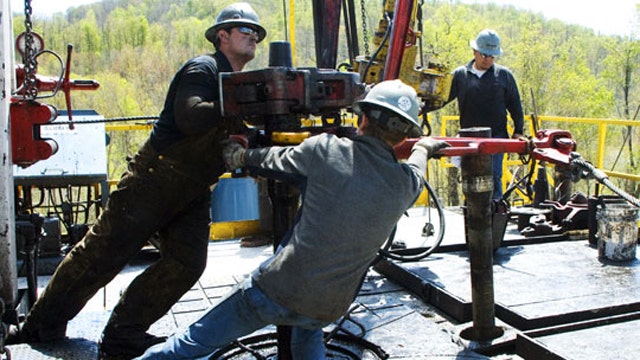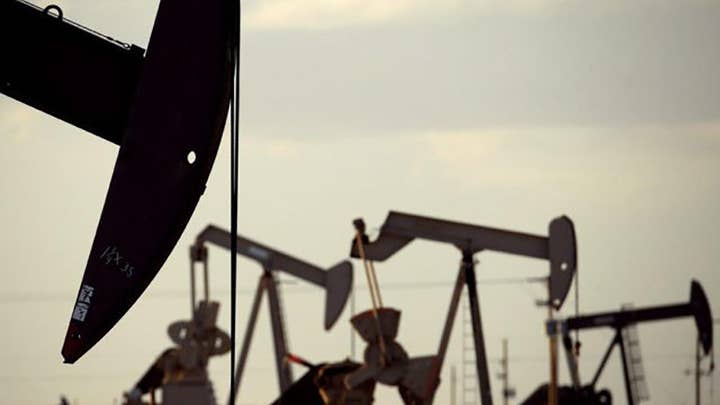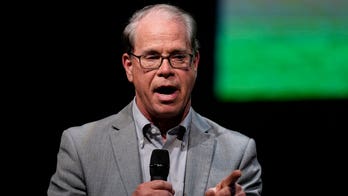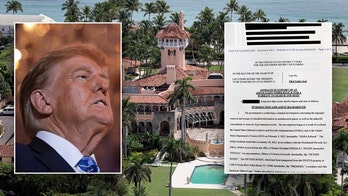California Gov. Gavin Newsom pulls plug on high-speed train project
Newsom says the Los Angeles to San Francisco train will 'cost too much and take too long'; William La Jeunesse reports.
In the next few weeks, California Gov. Gavin Newsom is slated to announce his administration’s energy policy strategy – and many environmental groups there are hoping it will include plans to end oil and gas drilling in the nation’s most populous state and phase out all fossil fuel extraction.
At the very least, green groups are hoping that Newsom – who campaigned last year on a promise to end controversial extraction methods like fracking and who has been a key figure in the fight to curtail climate change – will create buffer zones for any new oil and gas wells near schools, hospitals and residential neighborhoods and also monitor for dangerous emissions from plugged or abandoned wells.
“I consider to remain optimistic given how he expressed interest in issues that [former California Gov. Jerry] Brown did not address,” Kathryn Phillips, the director of the Sierra Club California, told Fox News. “The governor needs to make a plan to transition the state away from oil and gas toward renewables, but also transition workers into jobs in that sector.”
CALIFORNIA GOV. NEWSOM OFFERS RARE PRAISE FOR TRUMP
But as Newsom’s term in Sacramento approaches its fifth month, many of these groups are losing patience as the governor tries to balance a clean energy agenda with the demands of an industry that supports hundreds of thousands of jobs in a state with around 26 million vehicles on the road.
“I’m taking a very pragmatic look at it, in scoping this,” Newsom told The Los Angeles Times recently. “It’s also an inclusive scoping because it includes people in the industry, that have jobs; communities that are impacted from an environmental justice prism but also from an economic justice prism. It’s a challenging issue.”
Newsom must now weigh the support he received from environmental groups while on the campaign trail – and his own assurances that he wants California to be powered 100 percent by renewable energy in the near future – with any moves that could negatively affect a billion-dollar industry in a state that has the world’s fifth largest economy.
Even with California’s oil production being in decline for years, the state was the nation’s fifth-largest domestic crude oil producer in 2017, according to figures compiled by the federal government.
“His intentions are very pragmatic,” Catherine Reheis-Boyd, the president of the Western States Petroleum Association, told Fox News. “Newsom understands the importance of an industry to the 40 million people who will be driving 26 million combustible engines tomorrow.”
CALIFORNIA GOV. NEWSOM CALLS TRUMP INCOMPETENT IN INAUGURAL SPEECH; VOWS TO FIGHT WH POLICIES
One practice that environmental groups are hoping Newsom will clamp down on more than his predecessor is hydraulic fracturing. Known more popularly as fracking, it is a method of oil and gas extraction in which large volumes of high-pressure water are shot into the ground.
Fracking has come under intense scrutiny in recent years amid widespread concerns over both the public health and environmental risks it poses. While Brown approved restrictions on the practice back in 2013, he was lambasted by green groups for not banning fracking outright amid his argument that it could provide economic opportunities to some Californians.
On the campaign trail last year Newsom was adamantly opposed to fracking, but has so far remained quiet about the practice – along with the possibility of banning offshore drilling in the state - when discussing his energy agenda. Newsom, however, told the "Los Angeles Times" that despite his commitment to renewable energies, it would be impossible to completely stop California’s reliance on fossil fuels at the moment.
“One cannot just turn off the switch. One cannot just immediately abut against a century of practice and policy,” Newsom said.
Still California is one of the nation’s leaders in pushing forth a green energy agenda.
Despite the criticism leveled against him for waffling on clamping down on the fossil fuel industry, Brown last year signed two pieces of legislation that effectively banned the construction of any new offshore oil and gas pipelines in the state’s waters and thwarted a Trump administration plan to open nearly 1.7 billion acres of coastal waters to drilling.
While California cannot directly block oil and gas drilling off its coast, the legislation that Brown signed aims to drive up the operating costs of these operations enough to make the effort unprofitable. The law does this by blocking state land managers from permitting the construction of new pipelines, piers, wharves or other infrastructure projects necessary to bring oil and gas from offshore drilling sites to land.
“California has positioned itself as the center of the Trump resistance,” Jessica Levinson, a clinical law professor at Loyola Law School in Los Angeles, told Fox News. “It’s bloody combat.”
California banned offshore drilling in state waters out to three miles back in 1994 and there haven’t been any new platforms built in the last 30 years. But California is the nation’s third-largest oil-producing state, behind Texas and North Dakota, and there are still 32 offshore oil platforms and artificial islands in federal and state waters off the coasts of Santa Barbara, Ventura, Los Angeles and Orange Counties.
CLICK HERE TO GET THE FOX NEWS APP
California may be leading the nation in curbing its reliance on fossil fuels and many environmental activists believe Newsom will take even bolder steps than his predecessor, energy industry insiders like Reheis-Boyd question what the point is when other states – and nations – are not doing their part as well.
“I get the idea of taking a lead on this issue and I think many companies agree with this,” she said. “But at what cost is this being done, especially when nobody else is doing anything.”








